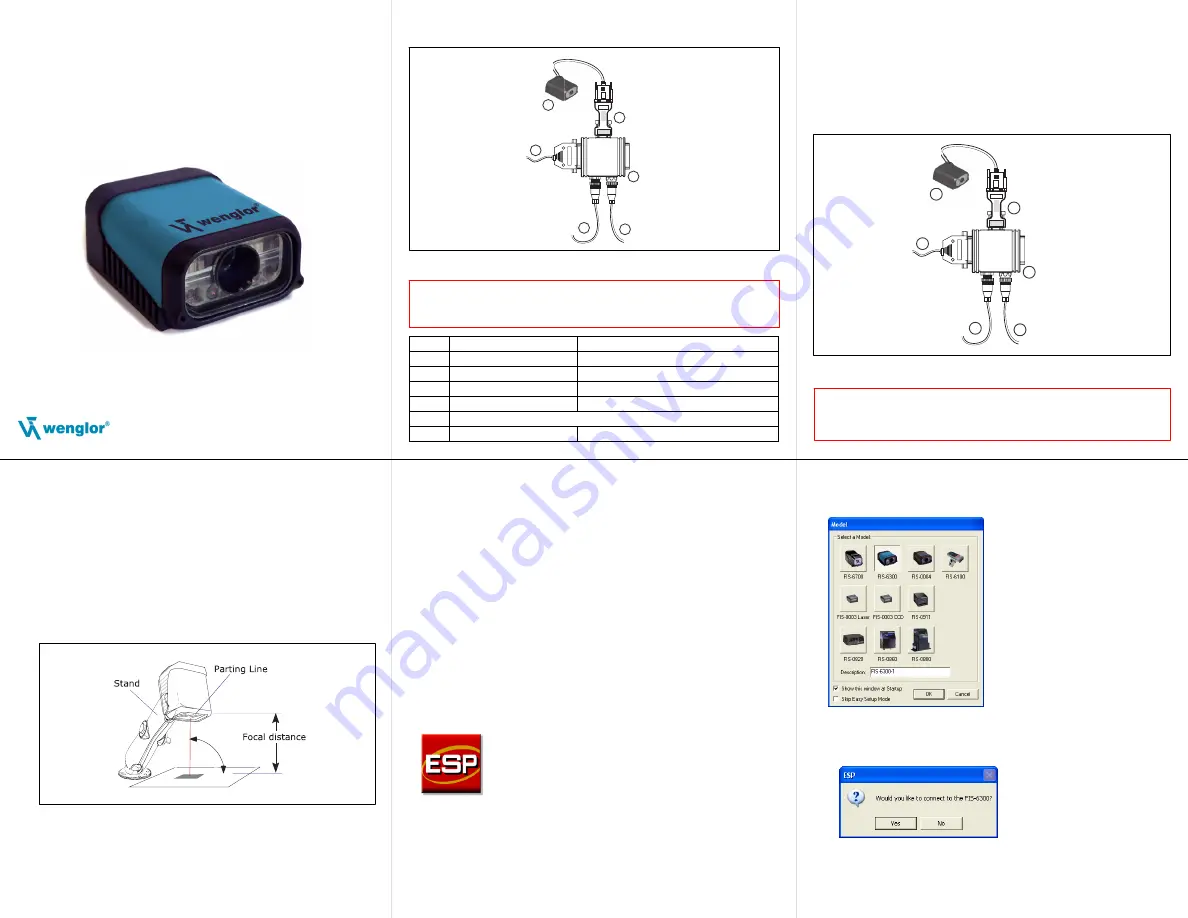
Copyright
©
2005 wenglor sensoric gmbh
Step 2 — Connect the System
Connecting by RS-232 / RS-422 / RS-485
• Connect the Imager (
1
) to the IB-131/IC-332 interface (
2
) and (
3
).
• Connect the host cable (
6
) to the host and to the host port on the IB-131 (
3
).
• Connect the object detector (
5
) to the IB-131 (
3
).
• Connect the power supply (
4
) to the IB-131 (
3
).
• Apply power to the Imager.
Hardware Configuration
Caution:
Be sure that all cables are connected
BEFORE
applying power
to the system. Always power down
BEFORE
disconnecting any cables.
4
2
3
6
Scanner
Networ
k
Host
1
5
Step 1 — Check Hardware
Item
Description
Part Number
1
FIS-6300 Imager
FIS-6300-XXXX
2
IC-332 Adapter
SD15SD15U
3
IB-131 Interface Box
AB1120
4
Power Supply
NT06US (110V); NT06 (220V)
5
wenglor Sensor
6
Host Cable
BD25BD9V01-2M
4
2
3
6
Scanner
Networ
k
Host
1
5
Caution:
Be sure that all cables are connected
BEFORE
applying power
to the system. Always power down
BEFORE
disconnecting any cables.
Hardware Required
Quick Start Guide
FIS-6300 Imager
P/N 83-736300 Rev A
Step 3 — Position Imager
• Position the Imager at a focal distance between
2”
and
6”
.
• Tip the Imager relative to the symbol to avoid the glare of direct (specular)
reflection. The case parting line should be perpendicular to the plane of the
symbol by either pitching the symbol or the Imager as shown.
• Position the Imager in a place with as little ambient light as possible.
• Symbols can be rotated (tilted) at any angle; however, for best results
symbols should be aligned with the FOV (field of view).
• In the case of linear symbols, aligning the bars in the direction of their
movement (“ladder” orientation) will minimize the chances of blurring,
and will produce better reads.
• Avoid excessive skew or pitch. Maximum skew is
±30°
; maximum pitch is
±30°
.
Note:
For instant setup and validation, the FIS-6300 can be hand-held or
placed on its side. For accuracy, however, a mounting arm adapter kit is
recommended.
Imager / Symbol Positioning
±30°
Step 4 — Install ESP
(
ESP
stands for
Easy Setup Program
.)
Once your Imager is connected to a host computer with Windows™ operating
system (98 or above), you can use
ESP
(Easy Setup Program) for configuration
and control.
To install
ESP
from a CD:
• Insert your wenglor CD ROM (ZUB-FIS-GB) in your computer’s CD drive.
• Select the “Configuration Software” file, launch
Setup.exe
under “wenglor
ESP
”, and follow the prompts.
To download
ESP
from the Web:
• Go to
.
• Navigate through the following sequence:
Download > Software > Barcode
Scanner
• Click the
Download
button and store the
ESP.zip
file to the location of your
choice on your hard drive.
• Extract the wenglor
ESP
WinZip files to a directory of your choice.
Remember
where your
ESP.ex
e file is stored on your hard drive!
• At the end of the install process, copy a shortcut
ESP
icon onto your desktop.
• Click the
ESP
icon to run the program.
Step 5 — Select Model
When you start
ESP
, this menu will appear:
• Select the FIS-6300 from the menu and click
OK
. If you do not want to
make this selection every time you start
ESP
, uncheck “Show This Window
at Startup”.
• Click
Yes
when this dialog appears:
Important:
The Imager is in
Continuous Read Mode
by default. For best
connection results, be sure that no symbols are within the Imager’s field of
view while attempting to connect.
Note:
If you need to select
another reader model later,
click the
Switch Model
button
near the top of the screen.


